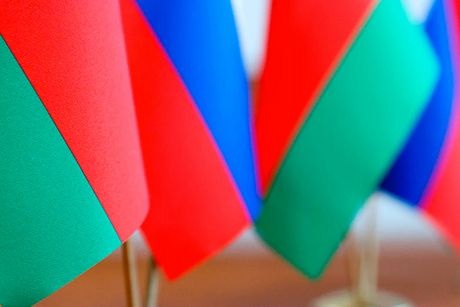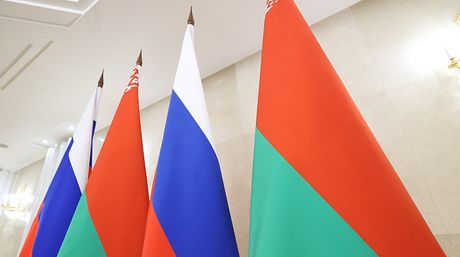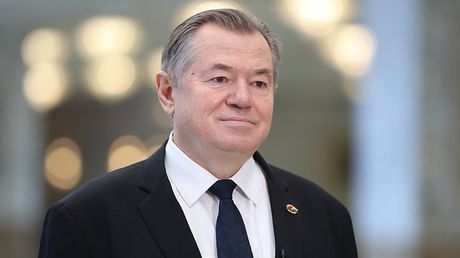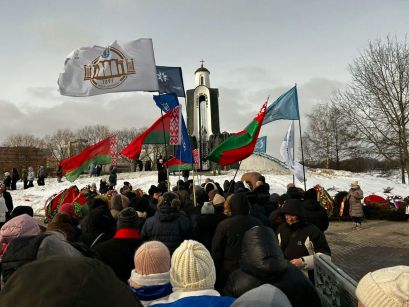The State Secretary of the Union State gave an interview to the BELTA news agency
11:00, 12 September
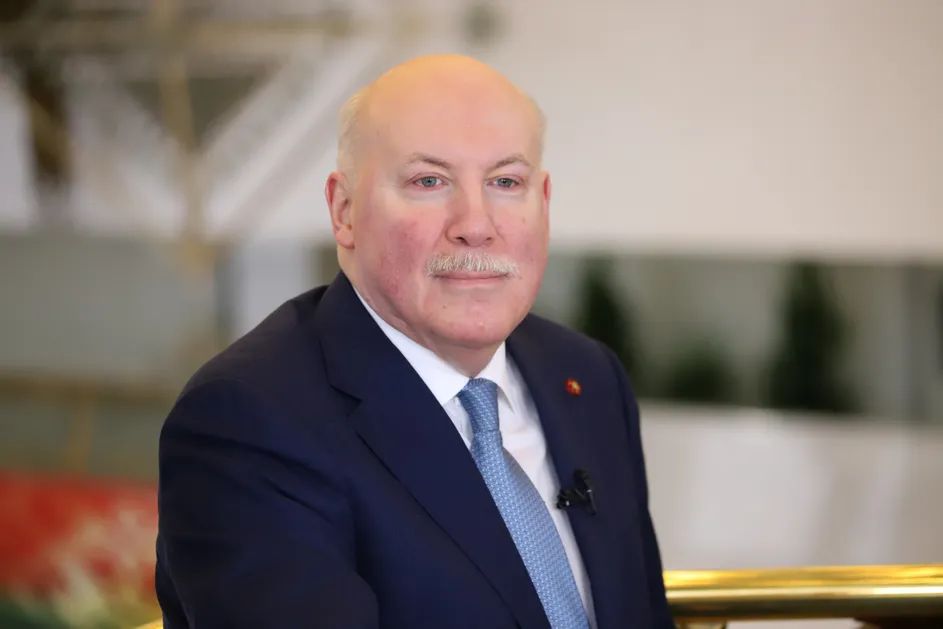
Photo: soyuz.by
The State Secretary of the Union State Dmitry Mezentsev gave an interview to the leading Belarusian news agency BELTA.
- Share on Facebook
- Share on VK
- Share on Twitter
At a recent meeting, the Chairman of the Supreme State Council of the Union State, President of Belarus Alexander Lukashenko, drew the attention of the republican ministries and the Standing Committee of the Union State to a number of problems related to ensuring equal rights of citizens of Belarus and Russia in various fields. In an interview with BElTA, the State Secretary of the Union State Dmitry Mezentsev told what measures are being taken to resolve the issues outlined by the head of the Belarusian state.
- Dmitry Fedorovich, how would you characterize the situation with ensuring equal rights of citizens in the Union State in general?
- Today it is obvious that the basic provisions of the Union agreement in this area are strictly observed by the parties. There are no obstacles for Belarusians in Russia, as well as for Russians in Belarus, to get a job, to receive education and advanced training, the unified state exam in Russia and centralized testing in Belarus are equated to each other – these are real achievements. It is possible for a number of universities to enter into joint programs so that children, while staying in Belarus, comprehend the sciences and programs of Russian universities, as well as vice versa, and at the end of their studies they can receive two diplomas.
There are also no restrictions on receiving emergency medical care, there are no obstacles in moving across the territory of the Union State.
We note the practice when Russian citizens can participate in local elections in Belarus and be elected. In the package of legislative proposals submitted to the State Duma of the Federal Assembly of the Russian Federation, there is a draft that, once adopted, will determine the right for Belarusians who have a residence permit and live in Russia to participate in municipal elections and be elected to municipal representative authorities.
Today, we have reason to say that during the years of union building, issues of ensuring equal rights in the field of social and labor relations have been practically resolved: the regulation of labor relations in both countries is almost the same. Belarusian citizens working in Russia have equal rights with Russians in terms of wages, working hours and rest time, and other issues of labor relations. In the Russian Federation, the registration of Belarusian citizens for work takes place according to the same "rules" and in the same order as for Russian citizens. The appointment and payment of pensions is also carried out by Russia and Belarus for the length of service formed in their territories.
A lot has already been done in the field of equal rights of citizens, but there is still much to be done. On July 29, 2024, the Chairman of the Supreme State Council of the Union State, President of Belarus Alexander Lukashenko, drew special attention of the meeting participants to the concrete results that the Union State will bring to its anniversary for ordinary people, which will be celebrated this year on December 8. The President instructed to comprehensively analyze the aspects of ensuring equal rights of citizens and instructed to pay more attention to solving everyday problems that people face.
Mutual provision of equal rights of citizens of Belarus and Russia is one of the most important topics for the Standing Committee. Ultimately, the very creation of the Union State is for the sake of the interests of the citizen.
- Belarusians who often visit Russia say that it is more difficult for them to get medical care than for Russians in Belarus. Is there really such a disparity? Under what conditions is medical care provided to citizens of Belarus and Russia on the territory of the Union State?
- Since the conclusion of the Union agreement between the Russian Federation and the Republic of Belarus on December 8, 1999, measures have been consistently implemented to ensure the convergence, integration and improvement of the effectiveness of existing health care models in our countries. Today, medical care - in an emergency form, including specialized ambulance for sudden acute illnesses, exacerbation of chronic diseases that threaten the patient's life, in case of accidents, injuries, poisoning - is provided to citizens of Belarus by Russian medical organizations free of charge and without any bureaucratic delays. The same procedure regarding ambulance services for Russian citizens is successfully operating in Belarus.
As for the planned treatment. In Russia, permanent residents of Belarus who are temporarily staying and working under employment contracts have equal rights with citizens of the Russian Federation to receive medical care, including free treatment in state and municipal healthcare institutions. In Belarus, Russian citizens who permanently reside and temporarily reside and work under employment contracts also have equal rights with Belarusians to receive free treatment in public health institutions.
However, despite the effective cooperation in the field of healthcare, we will strive to expand the practice of providing medical care for citizens and improve its quality. That is why the issue "On ensuring equal rights of citizens of the Republic of Belarus and citizens of the Russian Federation permanently residing (having a residence permit) on the territory of the Russian Federation and the Republic of Belarus to receive medical care, as well as the provision of urgently needed medicines" was submitted to the next meeting of the High-level Group of the Council of Ministers of the Union State. The reports of the responsible representatives of the Ministries of Health will be heard.
Today, we are conducting a dialogue with the Ministries of Health so that the provision of high-tech medical care will receive other scales, perhaps in the future, including through the support of the union budget.
- At the same meeting, Alexander Lukashenko instructed the Standing Committee to deal with the shortage of tickets for passenger trains between Minsk and Moscow, especially on holidays and weekends. How is this issue being resolved?
- The practice of interaction between the parties - the Russian Railways and the Belarusian Railway - to improve the passenger service system and ensure the growing cargo flow is one of the important areas of cooperation between the transport systems of the countries, I emphasize, united by the union treaty.
In pursuance of the instructions of the President of Belarus Alexander Lukashenko, we will strive to reach a different level of passenger transportation. In August, a meeting was held at the representative office of the Standing Committee in Minsk with the Minister of Transport and Communications Alexei Lyakhnovich and the new head of the Belarusian Railway Valery Verenich. We are grateful for the response to our proposal to permanently increase the number of wagons in the Belarus branded train on the Minsk- Moscow route, these are only the first steps.
A preliminary agreement has been reached with Russian Railways on the commissioning of one additional daily pair of Lastochka trains from November 1, 2024, departing from Moscow on Fridays, Saturdays and Sundays, and from Minsk on Saturdays, Sundays and Mondays.
In conditions of increasing passenger traffic, these measures will not be enough. That is why, at the initiative of the Standing Committee of the Union State, a meeting of the heads of Russian Railways and BDZ, Oleg Belozerov and Valery Verenich, will be held in Moscow in the near future. Prospects for wider use of the carriage fleet and its renewal within the framework of leasing instruments are being worked out.
- In continuation of the topic of railways. What about the plans for a high-speed highway between Moscow and Minsk? Is there already substantive work on this issue?
- Russian President Vladimir Putin has named the task of building the Minsk-Moscow high-speed railway among the priority large-scale national infrastructure projects. The implementation of this project will make it possible to emphasize the importance of relations within the framework of the Union State, to ensure different labor mobility, the ability to solve dozens of issues of interaction between production teams, government authorities, business representatives and thousands upon thousands of people who want to study the history, geography, culture, and national way of life of our countries.
It is planned that the length of the Moscow - Minsk HSR (conditional name - "Soyuz") will be 715 km. Trains will reach speeds of up to 400 km/h. It will take 21 high-speed trains. Passenger traffic is expected to reach 3.8 million people per year (currently 1.1 million). At the same time, the travel time will be 3 hours (now at least 7 hours).
The opportunity to quickly arrive in Moscow, as well as to get to the Belarusian capital, are completely different opportunities than we have today.
- Those who fly between Belarus and Russia are aware of the significant differences in the passage of pre-flight and post-flight procedures at the airports of the two countries, which was also noted by the President of the Republic Alexander Lukashenko. For example, there is no border control at the airports of Belarus for those departing to and from Russia. Is there a way to resolve this issue?
- At the meeting of the State Duma of the Union Council of Ministers, we discussed this issue in detail. But at the same time, I emphasize that the security guarantees of our citizens must be unconditional. Not all people come to the territory of the Union State with good intentions. The complication of the situation in the Eastern European region and on the continent as a whole, the existing terrorist threats against Belarus and Russia determine a stricter attitude towards the regime of crossing the external borders of the Union State. Today, the Border Committee of the Union State, the State Border Committee of Belarus and the Border Guard Service of the FSB of Russia are faced with the task of ensuring a single pass regime for third-country citizens arriving to us from abroad.
Nevertheless, simplifying the procedure for crossing the border for citizens of the Union State is one of the current tasks. It is significant that a citizen of Belarus arriving in Russia walks along a special corridor designated "For citizens of the Union State", this did not happen before. The fact of today is another confirmation of the "regime of equality" of the rights of citizens of Belarus and Russia, which still needs to be polished in a "technological format".
I would also like to note that with respect to citizens of Russia and Belarus who enter and leave the territory of the Russian Federation, there is no border control, the competent authorities do not collect, store and process their personal data, do not record the fact of crossing the border by stamping in their passport, and trips to each other are possible on domestic - not foreign - passports. The competent authorities of Russia conduct passport control solely for one purpose - to identify third-country nationals in the general flow of incoming or outgoing persons and redirect them to border control. Thus, it is incorrect to talk about border control for citizens of Russia and Belarus in this case.
It is important to emphasize that this is not passport control, which is present in the interstate regime of crossing the state border, but the clarification of passport data, Belarusians undergo this procedure on an equal basis with Russians.
- The topic of roaming cancellation has not been removed from the union agenda for several years. And if the issue of the cost of roaming calls is no longer so acute, then prices, for example, for SMS or mobile Internet roaming are still "foreign". When will citizens of the two countries stop noticing the difference in mobile communication tariffs when traveling to Belarus or Russia?
- The issue of roaming cancellation is under special control. Work on the abolition of roaming in the territory of the Union State is carried out in stages.
Mobile operators have already introduced comfortable tariffs for international roaming services on the territory of the Union State. Tariffs for Belarusian subscribers to use roaming services in the territory of the Russian Federation have been reduced to a level comparable to subscription tariffs in the "home network", tariffs for outgoing calls in international roaming in the territory of the Union State have been reduced 28 times. As a result, the consumption of cellular services increased 1.5-2 times.
Following the consideration of this issue at the meeting of the HLG on June 10, 2024, the Ministries of Communications were instructed to complete work in order to apply comfortable tariff plans for Russian and Belarusian subscribers in the territory of the Union State: 300 minutes for voice calls and 21 GB for data transmission during a calendar month.
The results of the work on the abolition of roaming are planned to be discussed at the upcoming meetings of the HLG, the Union Council of Ministers. The Ministry of Communications of Belarus and the Ministry of Finance of Russia should complete the work before the meeting of the Supreme State Council in order to report to the heads of state that the problem with roaming is a thing of the past.



